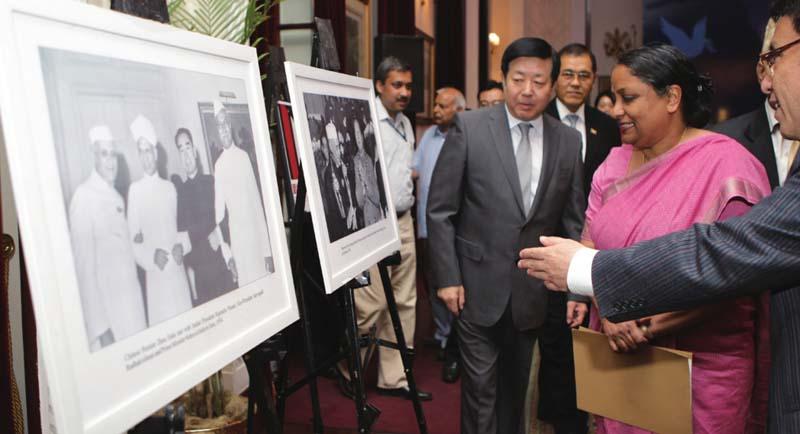Undiminished in Value
2019-04-18BySuHao&SuAnchao
By Su Hao & Su Anchao

Since it was founded in 1949, the Peoples Republic of China (PRC) has been seeking to build a fair and equitable international economic and political order. For that, in 1953, China proposed the Five Principles of Peaceful Coexistence, which have been acknowledged by the rest of the world as the basis for international relations.
This year marks the 65th anniversary of the fi ve principles that have withstood the Cold War and the turbulent period which followed. In the 21st century, they have become more vital to preserve the stability of the international order and promote peace and development.
The genesis
After the PRC was founded, other newly independent countries such as India and Myanmar, then called Burma, although following a social system different from Chinas, did not want to follow the West and regard China as an enemy. Instead, they hoped to engage in trade and develop bilateral relations with China.
To create a sound environment for development, Chinese Premier Zhou Enlai propounded the Five Principles of Peaceful Coexistence during his meeting with a delegation from India in December 1953. The five principles are mutual respect for sovereignty and territorial integrity, mutual non-aggression, non-interference in each others internal affairs, equality and mutual benefi t, and peaceful coexistence.
In April 1954, the five principles were written into the preface to the Agreement on Trade and Intercourse Between the Tibet Region of China and India as a guideline for bilateral relations.
During Zhous visits to India and Myanmar in 1954, China issued joint statements with the two countries, affirming their commitment to following the five principles among themselves as well as with other countries in the world.
The fi ve principles have changed power politics based on the perception that strong nations can dominate weak ones and provided a new direction to build an international society.
China believes in harmony without uniformity, peace among all nations and nonaggression. The inclusive Chinese culture therefore advocates harmonious coexistence with other countries. In the Chinese view, the world means unity in diversity. This cultural tradition is significant for establishing norms for international relations today.
The key elements of the fi ve principles, mutual benefit and coexistence, demonstrate Asian countries new expectations for international relations and the principle of international rule of law that gives countries rights, obligations and responsibilities.
Mutual respect for sovereignty and territorial integrity is a precondition of bilateral relations, and mutual non-aggression and non-interference in each others internal affairs guarantee that. Equality and mutual benefit are the direct results of this and peaceful coexistence is the general principle, which indicate coexistence and common prosperity are achievable in a diverse world.
The current scenario
The world is undergoing major changes unprecedented in a century. On the one hand, developing countries have risen in groups with their interdependency deepening and the new tide of globalization continues to surge.
On the other hand, international society has entered a turbulent period, characterized by challenges and contradictions, an increasing gap between developed and developing countries, and regional conflicts. Some major Western countries are pursuing hegemony and power politics, and antiglobalization and populism are on the rise. Peace still eludes the world.
Against this background, a fair and rational new international relationship has to be built among countries following the fi ve principles for peace and development.
Countries should respect each others sovereignty and territorial integrity, the most basic core principle. However, the U.S. arbitrary recognition of Israels sovereignty over the Golan Heights not only violates the international consensus that this area is Syrian territory occupied by Israel but also adds turbulence in the Middle East. The international community needs to prevent armed conflicts by safeguarding territorial sovereignty.
Moreover, countries should observe the principle of mutual non-aggression in efforts to maintain world peace and stability. At the beginning of 2019, a fresh military confl ict erupted between India and Pakistan, as India claimed that Pakistan should be responsible for a terrorist attack within Indian-controlled Kashmir. The protracted confl ict has heightened the tension in the region.
Disagreements and disputes between countries should be resolved through dialogue and not the use or threat of force. Security should be a common and universal concern with all countries championing common, comprehensive, cooperative and sustainable security, and respecting and ensuring one anothers security.
Countries should maintain non-interference in other countries internal affairs, which is increasingly becoming the basic principle of international relations. The social system and development road chosen by every country based on their own circumstances must be respected. One country should not subvert other legitimate authorities for its own selfi sh gains.
A political crisis recently broke out in Venezuela. Some countries openly intervene in the oil-rich countrys internal situation by supporting the opposition leader and forcing the legitimate president to step down. This interference will not only fail to resolve Venezuelas internal problems but exacerbate regional tensions.
Equality and mutual benefit are the basis of friendly cooperation. In an increasingly unbalanced world facing a widening gap between the North and the South, countries should strengthen economic cooperation on the basis of equality to reap mutual benefit and win-win results. They should jointly develop an open world economy and fight trade protectionism in all forms to promote common development.
The development of a diverse world relies on peaceful coexistence. Western powers have long tried to transform the world and impose their own social models on other countries. They have incited “color revolutions” in many developing countries and stirred instability in some regions. Countries should respect others differences and interests while pursuing their own and advancing interests common to all.
Promoter and observant
Although China has developed rapidly over the past 40 years since the reform and opening-up policy was implemented and its international status has improved signifi -cantly, it has stayed on the path of peaceful development.
After the 18th National Congress of the Communist Party of China (CPC) in 2012, China has followed the Five Principles of Peaceful Coexistence more pragmatically. It is guided by the principle of amity, sincerity, mutual benefi t and inclusiveness in deepening mutually benefi cial cooperation with its neighbors and seeks to ensure greater gains for others through its own development. With the Belt and Road Initiative proposed by President Xi Jinping in 2013, China hopes to achieve equal coordination and interconnection with other participating countries so that they can achieve common prosperity.
At the commemoration of the 60th anniversary of the Five Principles of Peaceful Coexistence in June 2014, Xi reiterated that China will uphold sovereign equality, common security and common development. It will promote win-win cooperation, champion inclusiveness and mutual learning as well as uphold fairness and justice, which will enrich the fi ve principles.
Xi also emphasized that “hegemony or militarism is simply not in the genes of the Chinese.” “China neither interferes in other countries internal affairs nor imposes its will on others,” he said. “It will never seek hegemony no matter how strong it may become.”
In his report to the 19th CPC National Congress in 2017, Xi said, “China remains firm in its commitment to strengthening friendship and cooperation with other countries on the basis of the Five Principles of Peaceful Coexistence, and to forging a new form of international relations featuring mutual respect, fairness, justice and win-win cooperation.”
In the international arena, China up- holds the fi ve principles, seeks justice and opposes hegemony and interference in others internal affairs. It promotes talks to resolve international conflicts and seeks peaceful settlements on the basis of equality and respect.
For example, in the recent conflict between India and Pakistan, China called on the two countries to fully respect each others sovereignty and territorial integrity and seek a peaceful settlement to prevent the situation from escalating.
Moreover, China has established special envoys for the Middle East and Africa for the resolution of burning regional issues and implementing the fi ve principles.
China has maintained and promoted the Five Principles of Peaceful Coexistence for 65 years. Today, as it is committed to developing new-type international relations and building a community with a shared future for humanity, the spirit of the five principles remains as relevant as ever.
